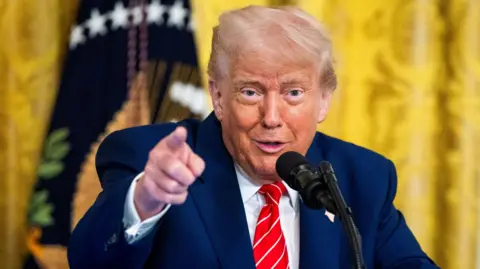Trump proposes 80% China tariff ahead of trade talks
 EPA-EFE/Shutterstock
EPA-EFE/ShutterstockUS President Donald Trump has proposed cutting tariffs on goods from China, in his latest comment to signal interest in de-escalating the trade war between the world's two biggest economies.
"80% Tariff on China seems right," Trump wrote on social media on Friday, ahead of trade talks between the two countries in Switzerland.
China's Vice Foreign Minister Hua Chunying also struck a confident note ahead of the meetings, saying Beijing had "full confidence" in its ability to manage trade issues with the US.
Since returning to the White House, Trump has hit Chinese imports with 145% tariffs and China has retaliated with levies of 125% on some US goods, driving down trade between the two nations.
On Friday, official figures for April showed China's exports to the US fell by more than 20% compared to a year earlier. But at the same time its total exports rose by a better-than-expected 8.1%.
Officials in both Washington and Beijing are "under growing economic pressure", Dan Wang from political risk consultancy Eurasia Group told the BBC.
"The recent signals from both sides suggest a transactional de-escalation is on the table", she added.
The announcement earlier this week of the talks was welcomed as an important first step towards easing tensions but analysts have warned that this marks the start of what are likely to be lengthy negotiations.
"The systemic frictions between the US and China will not be resolved any time soon," said former US trade negotiator, Stephen Olson.
Any cuts to tariffs as a result of this meeting are likely to be "minor", he added.
The initial negotiations will be led by US Treasury Secretary Scott Bessent and China's Vice Premier and economic tsar He Lifeng.
But "I think everyone recognises that any final deal will require the active engagement of both presidents," Mr Olson said.
Another trade expert said that even if the new tariffs imposed by Trump were lifted, the two countries would still have major issues to overcome.
"A realistic goal is probably at best a pullback from the sky-high bilateral tariffs but that would still leave in place high tariff barriers and various other restrictions", the former head of the International Monetary Fund's (IMF) China division, Eswar Prasad told BBC News.
On social media on Friday, Trump called on China to "open up its market" to the US. He said any tariff reduction would be "up to Scott B".
In earlier remarks on Thursday, he had said he expected a "very friendly" meeting.
The talks between China and the US are set to take place just two days after the UK became the first country to strike a tariffs deal with the Trump administration.
The US agreed to reduce import taxes on a set number of British cars and allow some steel and aluminium into the country tariff-free, in exchange for new access to US beef and other exports, according to an outline of the new agreement.
Countries around the world are scrambling to make similar deals before steep US import taxes are due to take effect next month.
Trump announced what he called "reciprocal tariffs" on dozens of countries in April but paused them shortly afterwards for 90 days to give their governments time to negotiate with his administration.
Businesses based in the US will also be watching events in Switzerland closely.
Wild Rye, a women's outdoor clothing firm based in the state of Idaho, has manufacturing stations in China and has been severely affected by the tariffs.
The cost of shipping goods has jumped significantly, the firm's chief executive, Cassie Abel, told the BBC's Today programme.
"We have a purchase order that's incoming, which is around $700,000 [of goods] that's now costing £1.2m in levies up from £200,000," she said.
Ms Abel added she was now looking to sell parts of her business to try to raise cash.

Follow the twists and turns of Trump's second term with North America correspondent Anthony Zurcher's weekly US Politics Unspun newsletter. Readers in the UK can sign up here. Those outside the UK can sign up here.
